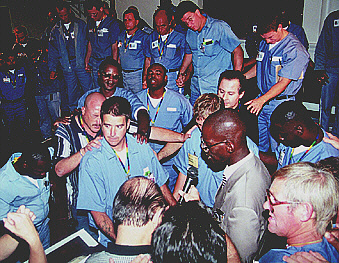General Board of Global Ministries
![]()
UM Information
UM
Reporter
![]()
Florida Southern College
![]()
Bethune
Cookman College
![]()
FL UM Children's Home
![]()
|
|
Weekend in prison is revival for DS |
|
Photo courtesy of Steve Sims, "The Florida Catholic" |
Prisoners at Polk Correctional Institution and leaders of a recent Kairos retreat pray over two prisoners about to be released from the prison. Prison ministry and ministry to newly released prisoners are essential, according to Lakeland District Superintendent Aldo Martin, who said many people need help reorienting themselves to life outside prison. |
| By Michael Wacht LAKELAND — "Periodically, one needs to re-encounter the Lord," said Lakeland District superintendent Rev. Aldo Martin. "We are wrapped up in our work, visitation and going to church each week. We need to stop and lean on the Lord and receive him inside." For Martin, that opportunity came last October when he and 35 other men gave a Kairos retreat for a group of 29 inmates at the Polk Correctional Institution in Polk County. "I give thanks to God," he said. "It renewed my faith and my confidence in the power of God to change people." Kairos is an international and interdenominational ministry founded in 1976, according to the ministry’s executive director, Ike Griffin. Its weekend events are similar in structure to the United Methodist Walk to Emmaus, in which participants are invited to attend a three-day weekend event by friends or acquaintances who have been through the program. Through Kairos, a team of 30 volunteers spends three days in the prison giving talks, leading discussions and counseling prisoners. The Kairos leadership team at the Polk prison was multicultural, as well as ecumenical, Martin said. "There were Catholics, Baptists, Lutherans, Anglicans and men from non-denominational churches," he said. "And there were several Latinos." Martin has been involved in three similar retreats in the past six months and was the spiritual director for the second Walk to Emmaus in Cuba. He said the trips to Cuba and the prison were very similar. "When I went to Cuba, I was happy to encounter family and friends and the church in that country," he said. "And it touched my heart and gave me joy because they live with so little physical freedom, but so much spiritual freedom." He said he also saw freedom behind prison bars. "Jesus is never in prison. He is always free," Martin said. "Many people in prisons spend a lot of time alone, and they have time to think…they get a very personal sense of the presence of Jesus Christ. It gives much hope, and they don’t feel so alone." Martin said he saw evidence of Jesus’ presence from the very beginning. When the prisoners realized outsiders who were not family or friends were visiting them, it gave them faith. "Several…said to me that ‘in many years this is the first time I’ve felt hope,’ " he said. The Kairos team shared the gospel of Jesus Christ through discussions, singing and group prayer, according to Martin. He said they witnessed a change in the prisoners, which some of the prisoners shared Saturday night. "The love and the powerful message of Jesus Christ changed their hard hearts," Martin said. "In 96 hours, the visited and the visitor became family." Martin said all Christians should experience what he experienced. "Jesus Christ sent us to visit the prisoners. He said, ‘when you do, you visited me.’ For these people, he died on the cross," Martin said. "Every Christian, once in their life, ought to visit a person in prison." Martins says Christians should also be more intentional about their ministry to ex-prisoners. He said many prisoners are angry, and when they are released they are ready to commit another crime to act out that anger. Churches, he said, can be a place for prisoners to reorient themselves and begin a new life outside prison. Martin also believes a Kairos experience can benefit pastors. "It’s so different from the things in the church, where we see people fighting and arguing." Top
of this page |

